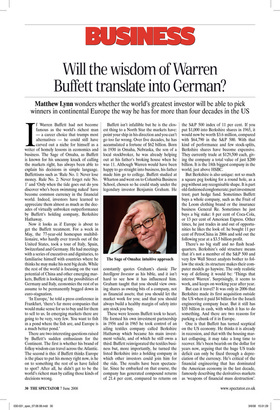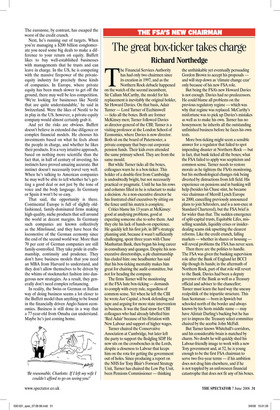Will the wisdom of Warren Buffett translate into German?
Matthew Lynn wonders whether the world’s greatest investor will be able to pick winners in continental Europe the way he has for more than four decades in the US If Warren Buffett had not become famous as the world’s richest man — a career choice that trumps most alternatives — he could still have carved out a niche for himself as a writer of homely lessons in economics and business. The Sage of Omaha, as Buffett is known for his uncanny knack of calling the markets right, has always been able to explain his decisions in simple language. Buffettisms such as ‘Rule No. 1: Never lose money. Rule No. 2: Never forget rule No. 1’ and ‘Only when the tide goes out do you discover who’s been swimming naked’ have become common currency in the financial world. Indeed, investors have learned to appreciate them almost as much as the decades of virtually unbroken outperformance by Buffett’s holding company, Berkshire Hathaway.
Now it looks as if Europe is about to get the Buffett treatment. For a week in May, the 77-year-old homespun multibillionaire, who hardly ever travels out of the United States, took a tour of Italy, Spain, Switzerland and Germany. He had meetings with a series of executives and dignitaries, to familiarise himself with countries where he thinks he may make his next big deals. While the rest of the world is focusing on the vast potential of China and other emerging markets, Buffett is looking at the possibilities of Germany and Italy, economies the rest of us assume to be permanently bogged down in euro-stagnation.
‘In Europe,’ he told a press conference in Frankfurt, ‘there’s far more companies that would make sense for us to buy and for them to sell to us. In emerging markets there are going to be very, very few. You want to fish in a pond where the fish are, and Europe is a much better pond.’ There are two interesting questions raised by Buffett’s sudden enthusiasm for the Continent. The first is whether his brand of folksy wisdom can travel across the Atlantic. The second is this: if Buffett thinks Europe is the place to put his money right now, is he on to something the rest of us have failed to spot? After all, he didn’t get to be the world’s richest man by calling those kinds of decisions wrong. Buffett isn’t infallible but he is the closest thing to a North Star the markets have: point your ship in his direction and you can’t go too far wrong. Over five decades, he has accumulated a fortune of $62 billion. Born in 1930 in Omaha, Nebraska, the son of a local stockbroker, he was already helping out at his father’s broking house when he was 11. Although Warren would have been happy to go straight into business, his father made him go to college. Buffett studied at Wharton and went on to Columbia Business School, chosen so he could study under the legendary investor Benjamin Graham. He constantly quotes Graham’s classic The Intelligent Investor as his bible, and it isn’t hard to see how it has influenced him. Graham taught that you should view owning shares as owning bits of a company, not as financial assets; that you should let the market work for you; and that you should always build a healthy margin of safety into any stock you buy.
These were lessons Buffett took to heart. He formed his own investment partnership in 1956 and in 1965 he took control of an ailing textiles company called Berkshire Hathaway which became his main investment vehicle, and of which he still owns a third. Buffett reinvigorated the textiles business but, more importantly, he turned the listed Berkshire into a holding company in which other investors could join him for the ride. The results have been spectacular. Since he embarked on that course, the company has generated compound returns of 21.4 per cent, compared to returns on the S&P 500 index of 11 per cent. If you put $1,000 into Berkshire shares in 1965, it would now be worth $3.6 million, compared with $64,790 in the S&P 500. With that kind of performance and few stock-splits, Berkshire shares have become expensive. They currently trade at $129,500 each, giving the company a total value of just $200 billion. It is the 18th biggest company in the world, just above HSBC.
But Berkshire is also unique: not so much a square peg looking for a round hole, as a peg without any recognisable shape. It is part old-fashioned conglomerate; part investment trust; part hedge fund. Sometimes Buffett buys a whole company, such as the Fruit of the Loom clothing brand or the insurance business General Re. Sometimes he just buys a big stake: 8 per cent of Coca-Cola, or 13 per cent of American Express. Other times, he just trades in and out of opportunities he likes the look of: he bought 11 per cent of PetroChina in 2006 and sold out the following year at a $3.5 billion profit.
There’s no big staff and no flash headquarters. Berkshire’s odd structure means that it’s not a member of the S&P 500 and very few Wall Street analysts bother to follow the stock: its structure makes their computer models go haywire. The only realistic way of defining it would be: ‘Things that interest Warren’. Surprisingly, it seems to work, and keeps on working year after year.
But can it travel? It was only in 2006 that Berkshire made its first acquisition outside the US when it paid $4 billion for the Israeli engineering company Iscar. But it still has $35 billion in cash, with which it has to do something. And there are two reasons for parking a chunk of it in Europe.
One is that Buffett has turned sceptical on the US economy. He thinks it is already in recession, and that with the housing market collapsing, it may take a long time to recover. He’s been bearish on the dollar for years now, arguing that the huge US trade deficit can only be fixed through a depreciation of the currency. He’s critical of the financial engineering that has dominated the American economy in the last decade, famously describing the derivatives markets as ‘weapons of financial mass destruction’. The eurozone, by contrast, has escaped the worst of the credit crunch.
Next, he’s running out of targets. When you’re managing a $200 billion conglomerate you need some big deals to make a difference to your return on equity. Buffett likes to buy well-established businesses with managements that he trusts and can leave in charge. In the US, he is competing with the massive firepower of the privateequity industry for precisely those kinds of companies. In Europe, where private equity has been much slower to get off the ground, there may well be less competition. ‘We’re looking for businesses like Nestlé that are quite understandable,’ he said in Switzerland. Were the likes of Nestlé to be in play in the US, however, a private-equity company would almost certainly grab it.
And yet the risks are obvious. Buffett doesn’t believe in extended due diligence or complex financial models. He chooses his investments based on what he feels about the people in charge, and whether he likes their products. It is a very intuitive approach, based on nothing more scientific than the fact that, in half of century of investing, his instincts have proved amazing accurate. But instinct doesn’t necessarily travel very well. When he’s talking to American companies he may well be able to tell whether he’s getting a good deal or not just by the tone of voice and the body language. In Germany or Spain it won’t be so easy.
That said, the opportunity is there. Continental Europe is full of slightly oldfashioned, family-dominated firms making high-quality, niche products that sell around the world at decent margins. In Germany such companies are known collectively as the Mittelstand, and they have been the locomotive of the German economy since the end of the second world war. More than 70 per cent of German companies are still family-controlled. They take pride in craftsmanship, continuity and prudence. They don’t have business models that you need an MBA from Harvard to understand, and they don’t allow themselves to be driven by the whims of stockmarket fashion into dangerous new strategies. As a result, they generally don’t need complex refinancing.
In reality, the Swiss or German or Italian way of doing business seems a lot closer to the Buffett model than anything to be found in the financially driven Anglo-Saxon economies. Business is still done in a way that a 77-year-old from Omaha can understand. Maybe he’s just coming home.











































































 Previous page
Previous page